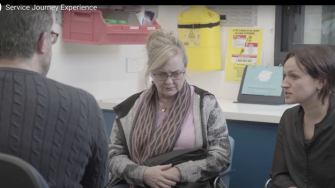
The challenge
Organisations need to be able to respond to the needs of people with lived experience (PWLE) of mental health issues to lower mortality and mortality. In the NSW Health Literacy Initiative, a research consortium developed resources and a model of mental health literacy responsiveness to improve mental health service access and health outcomes. This was to be achieved through the development of education and training assets to improve health literacy responsiveness of organisations to be implemented across Primary Health Networks (PHNs) in NSW. 83
The Solution
Extensive research and codesign with service providers, people with lived experience and caring, families and kinship groups, produced 11 areas for action to build system-wide mental health literacy responsiveness. A critical component of this initiative was that the materials and implementation process were co-designed with all relevant stakeholders using the Ophelia (Optimising Health Literacy and Access) process. 57
The Impact
Health literacy of organisations, providers and PWLE improves health outcomes and equity, and impacts on health care costs and years with chronic illness. Mental health literacy helps people identify when they are experiencing a mental health issue and the likely causes, empowering them to work with and independently of services, as well as enabling early help-seeking and recovery. Organisations can undertake a three stage quality improvement process to better respond to people with different mental health literacy needs, preferences and strengths.
Ten sets of assets were produced to ensure health literacy responsiveness across orientating, evaluating, and implementing training. Health literacy development | Mental Health Commission of New South Wales (nswmentalhealthcommission.com.au).There was evidence that all participating PHNs being actively involved in health literacy activities ranging from discrete activities, through to organisational/systems level initiatives.
Key people and partners
Funder: Mental Health Commission of NSW
A consortium of researchers from Swinburne University of Technology, the University of New South Wales and the University of Newcastle, as well as peak bodies, service providers, Primary Health Networks and community members.
- Chief investigators (Swinburne University of Technology)
Richard Osborne (Consortium lead), Neil Thomas, Shandell Elmer, Ranjit Nadarajah - Chief investigators (UNSW)
Mark Harris (UNSW lead), Catherine Spooner, Cathy O’Callaghan, Xue (Snow) Li - Chief investigators (University of Newcastle)
Leigh Kinsman, Graeme Browne, Pauletta Irwin
Video as part of the Service Experience Journey Toolkit follows the patient experience journey and aims to prompt discussion and reflection about the responsiveness of primary health care services, especially general practice, to people with a lived experience of mental health issues.
